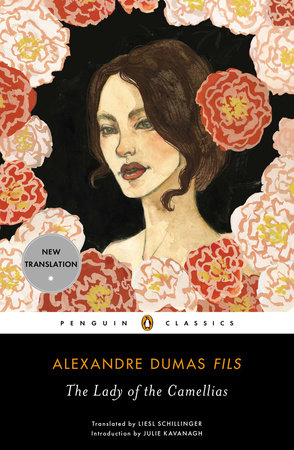by Alexandre Dumas Fils
D. Appleton & Co.
One of the greatest love stories of all time, this novel has fascinated generations of readers. Dumas's subtle and moving portrait of a woman in love is based on his own love affair with one of the most desirable courtesans in Paris.
Minor and Short Spoiler At The End
I knew Lady of the Camellias was going to be a tragic romantic story; I expected it to sweep me off my feet and make me exclaim dramatically from the intrigue, the clutching my pearls type of dramatic gasping. Though I didn't clutch my pearls, I enjoyed this novel and its drama thoroughly.
The prose, translated from French, was deceptively simple—didn't speak in a roundabout manner, which most Classics unfortunately do. I did not realize its depth until after further analysis and contemplation: the prose is delicately woven, but bursting with passion. Simple, yet impactful writing. Dumas Fils intricately describes the idyllic countryside, teeming with Armand's and Marguerite's love and passion. It was beautiful; I envision the story like a Jackson Pollock painting: I see this red artistic chaos on a white canvas. The backdrop contrasts the concurrent and ensuing drama.
Dumas Fils also wrote some of the most romantic lines and coined some of the most poignant lines about humanity and life. They were thought-provoking and made me stop in my tracks to let the weight sink in. However, his preaching/prose related to religion was lost to me, not something I'm interested in or passionate about, but he certainly is.
The story parallels of Manon Lescaut, another novel with a similar premise, and Moulin Rouge parallels this novel. Manon is a "metaphor" for Marguerite, and Marguerite is often compared to Manon—after all, that's what a metaphor is. To oversimplify, they are both sex-workers that enjoy luxury, who have people that love them whole-heartedly, and they encounter difficulties. I thought the parallel was fun, but it is best depicted in the ballet where Armand and Marguerite are placed side by side with Des Grieux and Manon; you physically see them side to side.
The frame narration (forgot it was called that because of the trauma from Heart of Darkness) made the novel more interesting. The narrator and Armand are, in actuality/essentially, Alexandre Dumas Fils. I found this rather trippy and brilliant, "I'm talking about myself, but not directly." It's like you're the perpetrator, but you don't want to self-incriminate. The line between art and the artist is blurred.
The frame narration (forgot it was called that because of the trauma from Heart of Darkness) made the novel more interesting. The narrator and Armand are, in actuality/essentially, Alexandre Dumas Fils. I found this rather trippy and brilliant, "I'm talking about myself, but not directly." It's like you're the perpetrator, but you don't want to self-incriminate. The line between art and the artist is blurred.
I recommend you read this book because it is beautiful and so romantic. The lengths we go for love, the follies we commit in the name of love, and the pain we suffer because of love! If you plan to read the story, Google Books has a full, free edition here. Although the preface is long and dull, it is incredibly insightful, and it will enhance your comprehension. The Kindle app may still have the French version for free if you feel inclined to read it in its original form.
------------------
My overall impression is how pitiful and tragic Marguerite is. She has consumption, and she is a courtesan; people only love her for what she can offer, but not who she actually is. Once she falls in loves and finds someone that loves her equally, she sacrifices everything for the sake of love. Her actions are unnoticed and unrealized until later. She is scorned and dies alone. My heart went out to her. I think Dumas Fils was trying to portray how women, no matter their status or profession, live tragically. "He captures the human condition of suffering," as my former English teacher would say.



This is one of the few classics that I have heard very little about but had no idea how utterly tragic it was. I think it's the era of authors where they loved to write simply, so that the big moments of drama have much more of an impact on readers. I love stories that can paint vivid pictures for readers and this sounds incredibly moving. Wonderful review Vivien, I really enjoyed it!
ReplyDeleteAwwww, thank you so much! I'm glad I was able to bring this wonderful novel to your attention.
Delete